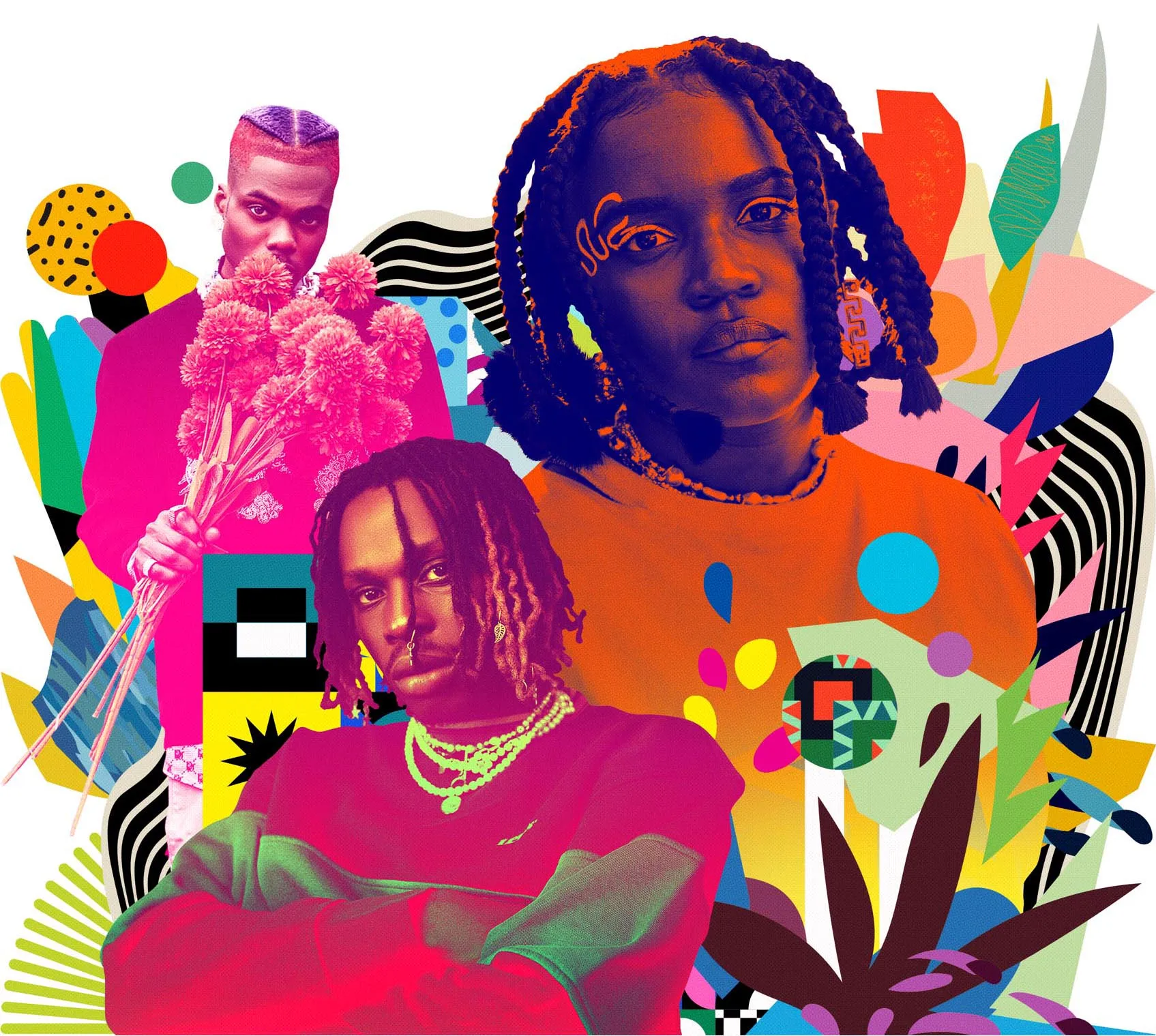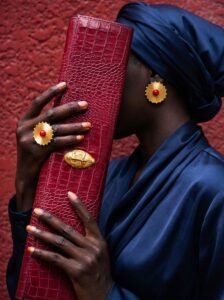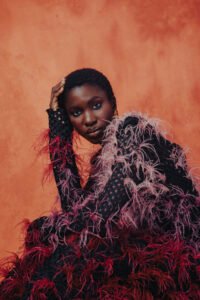One curiosity has remained intrinsic to the global rise of Afrobeats: How did this genre transcend geographical, cultural, and racial boundaries? Discussions about Afrobeats often highlight its transformative effect on artistic production within the West. But for those who see themselves represented in this global phenomenon, the conversation is a much more personal one, about representation and identity. While positive, this also forces us to confront how Africa and its artists have been defined up until now.
Afrobeats is a restorative genre. African artists such as Burna Boy, Wizkid, Tems, Diamond Platnumz, Amaarae, and Arya Starr have used their music to personify the diversity of African identities, moving us away from the colonial concept of African identity being monolithic. Through their enigmatic visibility, these artists emphasize self-acceptance, autonomy, and cultural pride reshaping what it means to be African in a post-Afrobeats epoch.
Afrobeats is a restorative genre. African artists such as Burna Boy, Wizkid, Tems, Diamond Platnumz, Amaarae, and Arya Starr have used their music to personify the diversity of African identities, moving us away from the colonial concept of African identity being monolithic. Through their enigmatic visibility, these artists emphasize self-acceptance, autonomy, and cultural pride reshaping what it means to be African in a post-Afrobeats epoch.
Afrobeats and Colonialism
In the song “Another Story” from Burna Boy’s hit album African Giant, the artist reflects on Nigeria’s colonial history. The first minute of the track provides historical context about the impact of British colonialism on the region. It highlights how Britain effectively “bought” Nigeria in 1900 from the “Royal Niger Company” (which survives as Unilever till this day). This payment illustrates that Britain’s interest in Nigeria was primarily economic. Colonialism was a business venture, with the British exploiting Nigeria’s resources and people for profit.
This historical reality continues to resonate in modern-day Nigeria, influencing the themes and messages in Afrobeats music. African artists like Burna Boy use their platform to address the lingering effects of colonialism, which still shape perceptions of African culture today. The centuries-long imperialism by Europe and America not only subjugated the African continent and her people but also marginalized African culture and music on a global scale. This marginalization has created a glass ceiling that African artists have been striving to shatter for decades.
The Rise of African Artists in the Global Music Scene
In March 2024, Tems became the first African singer to be awarded a Billboard Women in Music Award. That same year, she also became the first Nigerian artist to debut at number 1 on Billboard’s hot 100 charts for her joint track with Future and Drake, “Wait for U”. This would have been inconceivable a few years ago but African Artists continue to break convention.
2019 and 2020 marked a paradigm shift in the world of music. The release of some of the genre’s most decisive records coincided with the pandemic and the rise of TikTok. People had more time to explore new sounds and find new ways to engage with the music—and Afrobeats was it.
In 2019, Burna Boy’s sixth studio album African Giant set a new precedent for what was possible for Afrobeats artists. It became the most streamed African album on Spotify, garnering over 200 million streams on the platform, and was nominated for a Grammy.
From Wizkids’ Grammy-nominated Made In Lagos to Davido’s A Better Time, 2020 saw a slew of decade-defining albums that shot the genre into a new stratosphere.
Afrocentricity in Music Form
Not too long ago, it wasn’t exactly “cool” to speak in African accents or dialects. However, the representation of African artists on the world stage might have changed that.
Eurocentrism, the idea of Western superiority and the philosophy behind imperialism, inflicted internalized shame on Africans for simply being African, seeking to sanitize their distinctiveness. For instance, it condemned the language and accents of Africans as inferior, forcing them to reduce their cultural expressions to be more “palatable” to the West.
In the early 1980s, a new theory emerged to liberate African people from the effects of Eurocentrism: Afrocentrism called on Africans to embrace nationalistic pride and self-belief. Afrobeats stands as a musical embodiment of this ideology, unashamedly championing African identity and cultural expression.
Through the music, Afrobeats artists are helping to reclaim African identities. The success of the genre has seen international musicians like Justin Bieber, Chris Brown, Ed Sheeran, and Selena Gomez embrace the sound, remixing major Afrobeats hits and even dabbling in Pidgin lyrics. Afrobeats creates a unique cultural exchange as the genre is universal to all and openly welcomes others to participate and appreciate its charm.
Rebranding African Narratives
Afrobeats’ rise was serendipitous for many reasons. Beyond the music, the advent of the TikTok era provided a platform for the genre’s vibrant dance culture. Afrobeats dance challenges have amassed billions of views, year after year.
The phenomenon of Afrocentrism and African eccentricity in pop culture has also played a vital role in reshaping global perspectives of African expression beyond modern music.
Afro-Eccentricity is a phenomenon characterized by the fusion of African cultural heritage with innovative and unconventional expressions that challenge mainstream norms. Think Wizkid on the Dolce & Gabbana runway or Black Sherif closing Off-White™’s Paris show, African artists’ visibility in high fashion and new status as style icons, signifies an acceptance of a new and cool African outlook. One that transcends cultural limitations placed on the global South, whilst enhancing the cultural pride within Africa.
Afrobeats women, such as Tems, Arya Starr, and Amaarae, are also challenging Eurocentric beauty standards. Their success means the representation of darker skin tones, full lips, and curvaceous figures in the mainstream media. Their hair play alone – from eclectic braids, wigs, and curls to Bantu knots – defies colonial notions of beauty, which historically standardized light skin, straight hair, and a small nose.
Afrobeats, artists illustrate the diversity of beauty and identity, symbolizing just how Afro-eccentricity supports authenticity without compartmentalization. This alleviates a whole new generation of Africans from the pressures of reconciling their identities to fit a Western standard.
My Thoughts
The popularity of Afrobeats and the prevalence of African artists has undoubtedly shifted how we as Africans both within the continent and outside of it are viewed. The growing visibility has allowed us to tell our stories and reclaim our identities. My only concern however is, with the rise of Afrobeats does this genre have the potential to become another reductive catch-all term for African artists?
Recently, Wizkid, a Nigerian-born artist, spoke out against being referred to as an Afrobeats artist. Posting on his Instagram, he proclaimed that he is not only an Afrobeats artist and that his next album would not be an Afrobeats album. This stance, while deviant, might be a precautionary measure to avoid future artistic limitations and musical subjugation of African artists.
It’s undeniable that Afrobeats has broken the glass ceiling for African artists, leading to a deeper global appreciation of African culture. But it should not be a confining label, it should serve as a stepping stone that transforms how the West interacts with diverse music and cultures, encouraging our curiosity and openness to experiencing new sounds.





